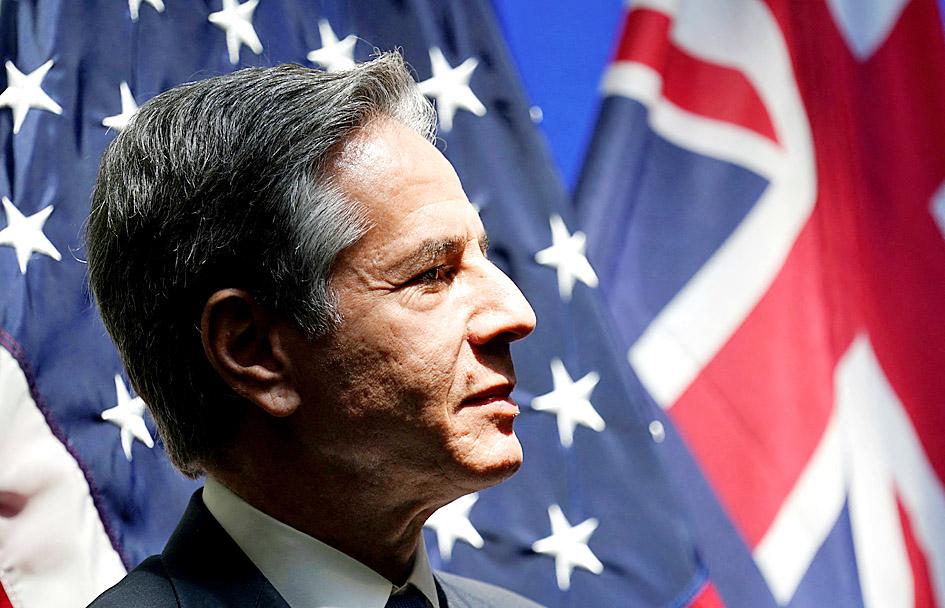The US remains focused long-term on the Indo-Pacific region, despite concerns over Russian aggression toward Ukraine, US Secretary of State Antony Blinken said yesterday.
Blinken is in Melbourne, Australia, for a meeting today with his counterparts from Australia, India and Japan.
The four nations form the Quadrilateral Security Dialogue, a bloc of Indo-Pacific democracies that was created to counter China’s regional influence.

Photo: AFP
“There are a few other things going on in the world right now, some of you may have noticed,” Blinken said in his first public address since arriving in Australia on Wednesday.
“We have a bit of a challenge with Ukraine and Russian aggression,” he said. “We’re working 24/7 on that, but we know, the [US] president [Joe Biden] knows better than anyone else, that so much of this century is going to be shaped by what happens here in the Indo-Pacific region.”
The Indo-Pacific is the fastest-growing region in the world, accounting for two-thirds of global economic growth over the past five years and home to half of the world’s population, Blinken said.
What matters in the region matters around the world, and challenges such as climate change and the COVID-19 pandemic cannot be tackled by any nation alone, he said.
“More than ever before, we need partnerships, we need alliances, we need coalitions of countries willing to put their efforts, their resources, their minds into tackling these problems,” Blinken said.
“What really drives us is a shared vision” of a “free and open society,” he added.
Blinken’s trip is designed to reinforce Washington’s interests in Asia and its intent to push back against increasing Chinese assertiveness in the region.
He is also to visit Fiji, and discuss concerns about North Korea with his Japanese and South Korean counterparts in Hawaii.
Australian Minister for Foreign Affairs Marise Payne, who is to chair today’s meeting, said that the agenda would include COVID-19 vaccine distribution, cyber and critical technologies, countering disinformation, terrorism, maritime security and climate change.

AGING: As of last month, people aged 65 or older accounted for 20.06 percent of the total population and the number of couples who got married fell by 18,685 from 2024 Taiwan has surpassed South Korea as the country least willing to have children, with an annual crude birthrate of 4.62 per 1,000 people, Ministry of the Interior data showed yesterday. The nation was previously ranked the second-lowest country in terms of total fertility rate, or the average number of children a woman has in her lifetime. However, South Korea’s fertility rate began to recover from 2023, with total fertility rate rising from 0.72 and estimated to reach 0.82 to 0.85 by last year, and the crude birthrate projected at 6.7 per 1,000 people. Japan’s crude birthrate was projected to fall below six,

US President Donald Trump in an interview with the New York Times published on Thursday said that “it’s up to” Chinese President Xi Jinping (習近平) what China does on Taiwan, but that he would be “very unhappy” with a change in the “status quo.” “He [Xi] considers it to be a part of China, and that’s up to him what he’s going to be doing, but I’ve expressed to him that I would be very unhappy if he did that, and I don’t think he’ll do that. I hope he doesn’t do that,” Trump said. Trump made the comments in the context

SELF-DEFENSE: Tokyo has accelerated its spending goal and its defense minister said the nation needs to discuss whether it should develop nuclear-powered submarines China is ramping up objections to what it sees as Japan’s desire to acquire nuclear weapons, despite Tokyo’s longstanding renunciation of such arms, deepening another fissure in the two neighbors’ increasingly tense ties. In what appears to be a concerted effort, China’s foreign and defense ministries issued statements on Thursday condemning alleged remilitarism efforts by Tokyo. The remarks came as two of the country’s top think tanks jointly issued a 29-page report framing actions by “right-wing forces” in Japan as posing a “serious threat” to world peace. While that report did not define “right-wing forces,” the Chinese Ministry of Foreign Affairs was

PREPAREDNESS: Given the difficulty of importing ammunition during wartime, the Ministry of National Defense said it would prioritize ‘coproduction’ partnerships A newly formed unit of the Marine Corps tasked with land-based security operations has recently replaced its aging, domestically produced rifles with more advanced, US-made M4A1 rifles, a source said yesterday. The unnamed source familiar with the matter said the First Security Battalion of the Marine Corps’ Air Defense and Base Guard Group has replaced its older T65K2 rifles, which have been in service since the late 1980s, with the newly received M4A1s. The source did not say exactly when the upgrade took place or how many M4A1s were issued to the battalion. The confirmation came after Chinese-language media reported